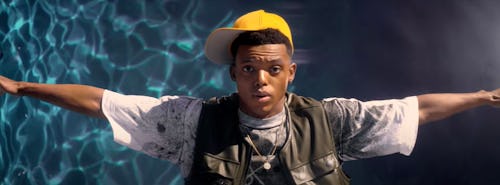
In 2019, filmmaker Morgan Cooper released a concept trailer for an interesting idea: what if The Fresh Prince of Bel-Air, the beloved 90s sitcom that launched Will Smith’s acting career, was retold as a dramatic story? The video went viral, Smith himself took notice and teamed up with Cooper, and now, some two and a half years later, the teaser trailer for the official spin-off, Bel-Air, has been released.
The early glimpse of the show, which will arrive some time in 2022, is still vague, but features Smith himself as a narrator, reciting, slowly and seriously, the lyrics from the show’s iconic, rambunctious theme song. Meanwhile, the new Will (Jabari Banks) is reaching for his crown and a throne, a callback to the show’s opening montage, only in this instance he’s underwater — plunged into a new world, in over his head. There isn’t much to gather from the brief teaser beyond this, but it seems the spin-off will stick to the original script — it’s the same tale of a kid from West Philadelphia, caught up in trouble and shipped off to a mansion in L.A., but filtered through a weightier tone and grittier voice.
Yet, while the new show might execute the spinoff’s ostensibly novel concept well enough, that version of Fresh Prince already exists — the original show offered everything one could want out of a “dramatic” retelling and more. Beyond how splendidly funny the cast and characters of the original were — at its core, Smith’s charisma elevated the comedy of the show, and watching any scene, one can see that it was a foregone conclusion he would go on to become a megastar — the show was often bolstered and is most admirable for the serious moments and thorny topics that came up often, especially early on, and always landed as gut-punches.
The most prominent example, of course, is Smith’s heartbreaking “why don’t he want me” scene in what is easily the show’s most famous dramatic episode about Will’s estranged father. But what makes the notion of a dramatic retelling interesting and what the more solemn spinoff will presumably explore, is the friction inherent within the show’s culture shock premise — how Will going from the streets of West Philadelphia to the manicured lawns of Bel-Air creates a tension within himself and around notions of class and Black identity. Yet, revisiting any of the early episodes from the first season yields a trove of gracefully written and acted episodes already centered around these very themes — ones that often finished with a striking dramatic catharsis by the end.
The pilot alone serves as a concise example, when the end of the episode features a poignant argument between Uncle Phil, who berates his nephew for squandering their good graces and legitimate concern for Will’s well-being, and Will, who scoffs at his family’s bourgeois front and in essence questions his uncle’s Blackness. This idea, in fact, is revisited partially three episodes later, when Uncle Phil’s mother visits and he is forced to reckon with the dramatic class differences between his upbringing and his now sterling silver life.
In the fifth episode, Don Cheadle guest stars as Will’s childhood friend visiting from West Philadelphia, and the clash of cultures he sees in Will comes to head in a moving conversation with Aunt Vivian at the end of the episode about how those less fortunate — those who can’t afford to be sent to Bel-Air — get left behind. The following episode is perhaps the most complex and remarkable moment in the entire show, centered around an instance of racial profiling that both renders the stark gap between Will and Carlton’s distinct understandings of the world as Black men — and yet also erases the illusion that the “system” Carlton so firmly believes in will treat him any differently.
This is all to say that fans of Fresh Prince who might be looking for a newly profound take on the lighthearted original will likely be treated with a subpar version of what was already in the show and made it brilliant in the first place. Worse yet, with Smith’s production company shepherding the project and the actor now embedded into what is, from an artistic standpoint, his flat and bland inspirational-guru career phase, this new show’s greatest threat is veering into the heavy-handed, cloying territory amid via its so-called serious tone.
What made the show great, in fact, was that it would quietly thread in tragic truths through the veneer of its goofy prince — and after it did so, it would let you sit with it all in a moment of silence, laugh track absent. It happens at the end of the racial profiling episode, when Carlton is left sitting quietly on the couch alone, confronted with just how naively he has come to see the world and how he has believed the world sees him.
And it happens at the end of the pilot episode, when, after lecturing Will for his unfair assumptions, Uncle Phil gets the last word and leaves the room. Will then drags his feet toward the nearby piano, and begins to plaintively clink out Beethoven, while his uncle watches, wordlessly, off in the distance, suddenly stunned and left chuckling at his own misjudgments. It’s these moments that, within the span of a scene, immediately render the idea of Bel-Air a futile exercise — you can’t do it any better than how it’s already been done.







